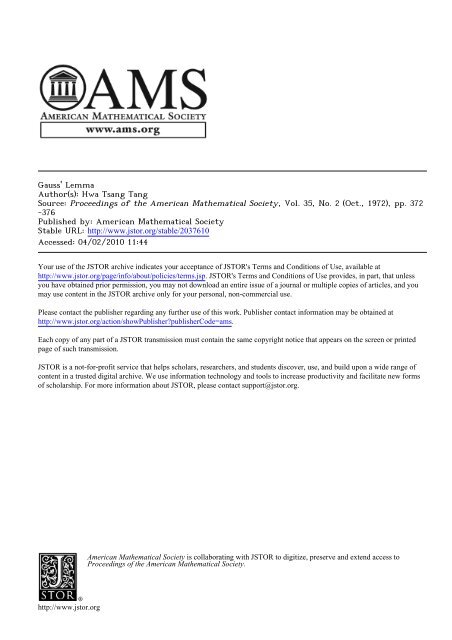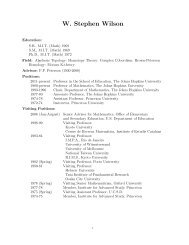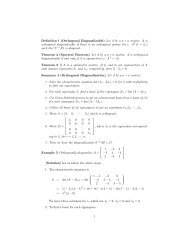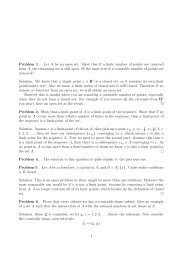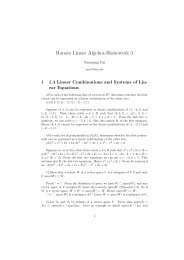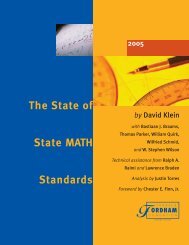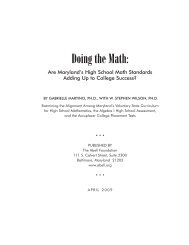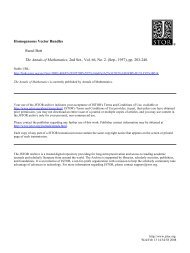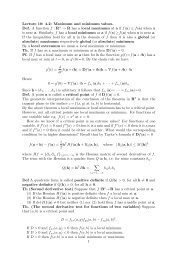Gauss' Lemma Author(s): Hwa Tsang Tang ... - JHU Mathematics
Gauss' Lemma Author(s): Hwa Tsang Tang ... - JHU Mathematics
Gauss' Lemma Author(s): Hwa Tsang Tang ... - JHU Mathematics
Create successful ePaper yourself
Turn your PDF publications into a flip-book with our unique Google optimized e-Paper software.
<strong>Gauss'</strong> <strong>Lemma</strong><br />
<strong>Author</strong>(s): <strong>Hwa</strong> <strong>Tsang</strong> <strong>Tang</strong><br />
Source: Proceedings of the American Mathematical Society, Vol. 35, No. 2 (Oct., 1972), pp. 372<br />
-376<br />
Published by: American Mathematical Society<br />
Stable URL: http://www.jstor.org/stable/2037610<br />
Accessed: 04/02/2010 11:44<br />
Your use of the JSTOR archive indicates your acceptance of JSTOR's Terms and Conditions of Use, available at<br />
http://www.jstor.org/page/info/about/policies/terms.jsp. JSTOR's Terms and Conditions of Use provides, in part, that unless<br />
you have obtained prior permission, you may not download an entire issue of a journal or multiple copies of articles, and you<br />
may use content in the JSTOR archive only for your personal, non-commercial use.<br />
Please contact the publisher regarding any further use of this work. Publisher contact information may be obtained at<br />
http://www.jstor.org/action/showPublisher?publisherCode=ams.<br />
Each copy of any part of a JSTOR transmission must contain the same copyright notice that appears on the screen or printed<br />
page of such transmission.<br />
JSTOR is a not-for-profit service that helps scholars, researchers, and students discover, use, and build upon a wide range of<br />
content in a trusted digital archive. We use information technology and tools to increase productivity and facilitate new forms<br />
of scholarship. For more information about JSTOR, please contact support@jstor.org.<br />
http://www.jstor.org<br />
American Mathematical Society is collaborating with JSTOR to digitize, preserve and extend access to<br />
Proceedings of the American Mathematical Society.
PROCEEDINGS OF THE<br />
AMERICAN MATHEMATICAL SOCIETY<br />
Volume 35, Number 2, October 1972<br />
GAUSS' LEMMA<br />
HWA TSANG TANG<br />
ABSTRACT. Let f(x) be a polynomial in several indeterminates<br />
with coefficients in an integral domain R with quotient field K. We<br />
prove that the principal ideal generated byf in the polynomial ring<br />
R [x] is prime ifff is irreducible over K and A-1 =R where A is the<br />
content off: We also prove that iff(x) is such that A-1=R andg(x)<br />
is a primitive polynomial in the sense that only a unit of R can<br />
divide each coefficient of g, thenfg will be primitive.<br />
1. Introduction. Let R [x] = R [x1, x2, , xj be a polynomial ring in<br />
n indeterminates with coefficients in an integral domain R, andf(x) E R [x].<br />
We give a necessary and sufficient condition forf to generate a principal<br />
prime ideal in R[x].<br />
THEOREM A. (f)R[x] is prime ifff is irreducible over K and A-'=R,<br />
where K is the quotient field of R and A is the R-ideal generated by the coefficients<br />
off and A-=R: KA.<br />
We definef to be super-primnitive if A-'=R.<br />
THEOREM D. (Over any integral domain) the product of a super-primitive<br />
polynomial with a primitive polynomial is primitive.<br />
We also show that super-primitive implies primitive (Theorem C) and<br />
that these two notions coincide over an integral domain in which every<br />
pair of elements has a "greatest common divisor", i.e., a common divisor<br />
which is a multiple of any other common divisor (Theorem H). Hence-<br />
forth we will call such a ring a GCD domain. For instance any valuation<br />
domain is a GCD domain, whereas J[Vl(-5)] is not.<br />
Thus we have genealized two related classical results:<br />
(1) <strong>Gauss'</strong> <strong>Lemma</strong>: Over a unique factorization domain, the product of<br />
primitive polynomials is primitive. Kaplansky [1, Example 8, p. 42]<br />
showed that the same is true over a GCD domain.<br />
(2) If R is a unique factorization domain, so is R[x]; and f(x) E R[x]<br />
is prime iff f is irreducible over K andf is primitive.<br />
Received by the editors September 7, 1971 and, in revised form, February 10, 1972.<br />
AMS 1970 subject classifications. Primary 13B25, 13A15; Secondary 13B20, 13F15.<br />
Key words and phrases. <strong>Gauss'</strong> <strong>Lemma</strong>, integral domain, content of polynomial,<br />
principal prime ideal, primitive polynomial, greatest common divisor, unique factori-<br />
zation domain. integrallv closed domain.<br />
? American Mathematical Society 1972<br />
372
GAUSS' LEMMA 373<br />
The results here are contained in the author's doctoral dissertation. The<br />
author expresses her gratitude to Professor Irving Kaplansky for his help<br />
and encouragement.<br />
2. Principal prime ideals in R[x]. Throughout this paper R is an<br />
(arbitrary) integral domain with K as its quotient field. If f(x) E R[x]=<br />
R[x,, * * *, xj, we define c(f)=the content off=the R-ideal generated by<br />
the coefficients off<br />
Now letf^(x) be a nonzero, nonconstant polynomial in R [x], with c(f)-<br />
A. Let H= (f)R [x], W= (f)K[x] r) R [x], and J=A-'H. Clearly Hc J' W<br />
are ideals of R [x]. When is H or J prime ? First we state (omitting the proof,<br />
which is routine) an easy technical result.<br />
PROPOSITION. Let X be an ideal in R [x] suich that Hz2 Xc: W. Then X is<br />
prime ifff is irreducible over K and X= W.<br />
We now study the conditions for H or J to coincide with W. We intro-<br />
duce the additional notations to be used throughout the paper. Let S=<br />
{I/r:r E R, r$ O}. Clearly RriS is the set of units of R.<br />
If g(x) E R [x], let B= c(g), and C= c(fg). Clearly Cc: AB.<br />
LEMMA 1. W=H iffJ=H ifA-'=R iff1B--l' S= C-' fSfor every g(x).<br />
LEMMA 2. W=J if (AB)- fnS= C- irS for every g(x).<br />
PROOF. W={f(x)*g(x)/t:g(x)e-R[x], te-R, tO}frR[x]; J=<br />
{f (x) * :E kjxj: each k, e A-1}; H={f (x) - g(x):g(x) E R[x]}.<br />
(i) W=H ifffg/t e R[x]g/t e R[x] iff 1/t E C---1/t E B-1 iff C-1fr<br />
SC: B-1 rS for every g(x).<br />
(ii) J=HiffA-'=R.<br />
(iii) Now suppose A-'=R and Cc: (t). Claim Bc: (t). Otherwise, we pass<br />
to the ring R[x]/(t)R[x]-R/(t)[x]. Using ' to denote homomorphic<br />
images, we havef 'g'=0 and g'$ 0. By a theorem of McCoy [2, Theorem 4,<br />
p. 34] there is r'0O in R/(t) such that rf'=O. Hence in R, r 0 (t) and<br />
rAC: (t). In other words rIt R and (r/t)AC:R, hence rnte-A-=R, a<br />
contradiction.<br />
(iv) W= J ifffg/t ie R [x] g/l = kjxj where each kj E A---I iff 1 /t E C-1 =><br />
B/tC A-1, i.e., (B/It)A C R, or I /t e (AB)-1 iff C-1 nSC (AB)-1 nS.<br />
THEOREM A. (f)R[x] is a prime ideal in R[x] ifff is irredhucible over K<br />
and A-'=R where A=c(f).<br />
REMARK. Compare with [1, Examples 1--5, p. 102].<br />
THEOREM B. If R is integrallj closed, tihen the idleal A--'(f)R [x] co-<br />
incides with (f)K[x] r) R [x], and is prime ifff is irreclucible over K.
374 H. T. TANG [October<br />
PROOF. Since R is integrally closed, (AB)-'= C-1 for every g(x)<br />
[1, Example 6(e), p. 52]. We now apply <strong>Lemma</strong> 2.<br />
3. Primitive and super-primitive polynomials. One consequence of<br />
<strong>Lemma</strong> 1 is: If A-'=R and B-' C0S=R AS then C-'nS=RnS also.<br />
The classical definition g(x) is primitive iff only the units of R divide<br />
each coefficient of g translates easily to: iff B-'AS=RnS where B=c(g).<br />
DEFINITION. f(x) is super-primitive iff A-'=R where A=c(f).<br />
THEOREM C. Super-primitive implies primitive.<br />
THEOREM D. The product of a super-primitive polynomial with a primi-<br />
tive polynomial is primitive.<br />
We give another characterization of super-primitive.<br />
THEOREM E. Let T be the set of prime ideals of R which are minimnal<br />
primes over ideals of the form (a): nb= {x E R: xb E Ra}. Then:<br />
(i) R=Cn{Rp:P E T}.<br />
(ii) A finitely generated ideal I is contained in some P E T if I-' OR.<br />
PROOF. (i) Let b/a E n {Rp: P E T}. Let J= (a): Rb. We show J= R.<br />
Otherwise Jc some P E T. For the P, let b/a=r/s, s 0 P. Then sb=ra, so<br />
s C J' P, a contradiction.<br />
(ii) First suppose Ic some P, minimal prime over J= (a): Rb. Localizing<br />
at P, Pp is the only prime ideal over Jp, so IpcPp=V1Jp. Let I=<br />
(cl, c2< * , Ck). For each i, (ci/l )nI=jiI/si for ji E J, si 0 P. If n= = ni and<br />
s= 7 si, we have sInc J, s q P. Since JcP, s 0 J. For any integer m> 1,<br />
we have sI 5Jr J= (a): Rb iff (sb/a)Imc R iff (sb/a)I1-lc I-'. Let k be the<br />
least integer such that sJk'GJ. Then (sb/a)Ik-JcI-1 and (sb/a)Ik-''R,<br />
whence I--' 'R.<br />
Conversely, suppose I? any P E T. Let b/a E I-' and let P E T. Since<br />
IP P, there is s e I, s 0 P. Since b/a I-', (b/a)s=r e R. Hence, bla=<br />
r/s E R_. Since this is true for every P E T, b/a E R by (i).<br />
In this context, a super-primitive polynomial f is one such that c(f) is<br />
not contained in any P E T.<br />
THEOREM F. The product of super-primitive polynomials is super-<br />
primitive.<br />
PROOF. Let f, g be super-primitive and assume c(fg)c P E T. Localiz-<br />
ing at P, we get c(fg)p=c(fp * gp). Since c(fp)=c(g1,)=Rp, it follows<br />
from [1, Example 9, p. 8 or Example 6(c), p. 52] that c(fg)p=R1,, a<br />
contradiction.<br />
THEOREM G. Let ai E R. If (al, * * *, a)-1'=R then (al, a<br />
.<br />
,<br />
R for anY set of integers ki>O.
1972] GAUSS' LEMMA 375<br />
PROOF. Immediate from Theorem E (ii).<br />
We give a sufficient condition for the existence of certain GCD's (for<br />
any integral domain).<br />
LEMMA 3. Let a1, , an E R, and A be the ideal they generate. Let<br />
d E R. Then the following are equivalent:<br />
(i) A-'-R/d.<br />
(ii) For every b E R, gcd(bai)=bd.<br />
(iii) For every k E A-', gcd(kaj)=kd.<br />
PROOFW The cyclic verification (i)=(iii)=(ii)=(i) is routine.<br />
When R is a GCD domain, the special case d= 1 yields<br />
THEOREM H. Over a GCD domain, super-primnitive is the same as primitive.<br />
4. The polynomial ring in one variable. Let R be an integral domain,<br />
and R[y] be the polynomial ring in one indeterminate y. We give some<br />
characterizations for R to be a GCD domain in terms of conditions on<br />
R[y].<br />
THEOREM I. The following are equivalent:<br />
I. R is a GCD domain.<br />
II. Every linear polynomial in R[y] is the product of an element in R<br />
with a super-primitive polynomial.<br />
III. (i) Every linear polynomial in R [y] is the product of an element in<br />
R with a primitive polynomial.<br />
(ii) In R [y] the product of two linear primitive polynomials is primitive.<br />
IV. For every nonzero prime ideal P in R[y] such that PnR=O, P is<br />
principal.<br />
V. For nonzero elements a, b in R, the ideal (a+by)K[y]nR[y] in<br />
R [y] is principal.<br />
PROOF. I is equivalent to II, by <strong>Lemma</strong> 4. Clearly I implies III. We<br />
now assume III and prove II. Given a+by in R[y], by 111(i), a+by=<br />
r(u+vy), r E R, u+vy primitive. Claim (u, v)-1=R. For, let k=c/d E<br />
(u, v)-1, c, d E R. By 111(i) we can assume c+dy primitive. By 111(ii),<br />
(c+dy)(u+vy)=cu+ (cv+du)y+dvy2 is primitive. Since k E (u, v)-1, d<br />
divides cu and dv. Thus d divides each of cu, dv+du and dv. Hence d is a<br />
unit and k E R.<br />
I =>IV. Select f(y) primitive and of the lowest degree in P. It follows<br />
that f is irreducible and (f)R[y] is prime. Thus P=(f)R[y], both con-<br />
tracting to 0 in R.<br />
Clearly IV=-V.
376 H. T. TANG<br />
V=>I1. Given a+by in R[y], by V, (a+by)K[y]nR[y]=(f)R[y] for<br />
somef(y) in R[y]. a+by=fg, g E R[y]; and f= (a+by)k, k E K[y]. Com-<br />
bining, f=fgk, gk = 1, hence g E R. Hence we have a+by=r(u+vy), with<br />
r, u, v in R. But then (u, v)-'=R by Theorem A.<br />
COROLLARY. R is a unique factorization domain if R satisfies the<br />
ascending chain condition on principal ideals and in R[y] the product of two<br />
linear primitive polynomials is primitive.<br />
REFERENCES<br />
1. I. Kaplansky, Commutative rings, Allyn and Bacon, Boston, Mass., 1970. MR 40<br />
#7234.<br />
2. N. H. McCoy, Rings and ideals, Carus Monograph Series, no. 8, Open Court,<br />
LaSalle, Ill., 1948. MR 10, 96.<br />
DEPARTMENT OF MATHEMATICS, CALIFORNIA STATE UNIVERSITY AT HAYWARD,<br />
HAYWARD, CALIFORNIA 94542


